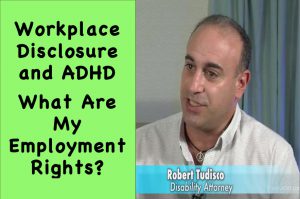What Are My Employment Rights?

Robert Tudisco – Disability Attorney
Can your employer penalize, demote, or even fire you for having ADHD? It happens. And it’s wrong. Robert Tudisco, a Disability Attorney, Non-Profit Consultant, & Motivational Speaker, lays out the facts around workplace disclosure and employment rights for adults with ADHD.
Legalities and Realities
Robert Tudisco:
I’m a special education attorney and my background is I’m a former prosecutor and was a criminal defense attorney for many years. Once i was diagnosed with ADHD I redirected my practice to work with families to get services for their students and i do a lot of work for people with disabilities, in terms of disability rights. I do some lobbying in Washington with other organizations, like CHADD etc..
Should I Disclose my ADHD?
One of the big questions that i get from a lot of adults that contact me with ADHD or any disability really is whether or not they should disclose to their employer that they have a disability and how that works.
Unfortunately under the law in order for the law The Americans with Disabilities Act or section 504 of the rehabilitation act in the United States to protect you you have to self-report your disability. Provide documentation and ask for specific accommodations.
The problem is when you’re a student you’re in an institutional setting. the law protects you, there’s no reason not to disclose, but in the workplace it’s a much more complicated issue, because some industries are still employing those stigmas. If it’s a highly competitive industry like a law firm or an accounting firm, and there you’re on a partnership track and it’s very competitive, it can be very difficult and put some people at a disadvantage.
The Law Can’t Protect You If You Don’t, BUT
So my response to adults is it really is a gut call for yourself you have to decide if it’s in your best interest to disclose and you know the law can’t protect you if you don’t, but there are other things that you can do to get accommodations without necessarily calling them accommodations, without disclosing.
I encourage adults to speak with their employers about their unique work style, for instance and center not only on the issue of accommodations but really letting the employer know that I can increase your bottom line if you provide me with a place to create a quiet space or if i can have someone to check in with from time to time. That’ll really enhance the ability that I have to provide a product for you in terms of a report or evaluation or whatever it is.
If you work within that context and it’s to be a better worker, a more productive worker, you can really get accommodations without calling them accommodations. Legally the law is not protecting you but you’re kind of protecting yourself, and that’s really important for adults to consider.
Part of the gut call I think has to do not only with the institution that you’re working for but who your immediate superior is and what the personality situation is, if you call it a disability and seek accommodations in a setting, like if you work for a college or if you work for a hospital or some federal agency they are required, and if you get a notice for instance that they’re putting you on probation, disclosing your disability kind of puts the brakes on the process.
Everybody is concerned about litigation and that may buy you some time, but at the same time it also kind of puts a target on your back. You don’t want to be in a position where people will say okay now we have to protect ourselves and figure out how to fire this person without getting sued and you don’t want to be in that position either.
So it really can be a tightrope that you have to walk and I think adults do get a lot more use out of understanding themselves and being able to articulate how they can tap into their unique gifts for that employer and enhance what the bottom line of the employer is, and in many cases that can make the difference.
Law Enforcement or Military Restrictions
I get questions about wanting to go into law enforcement or wanting to go into the military and what the restrictions are there and unfortunately in the US military you have to prove or establish that you are drug free in terms of stimulant medication free for a year’s time. Which is ironic because what happens is that the uS military typically gives special forces and fighter pilots stimulant medication whether they need it or not to hyper focus on their missions, but the ADHD stigma is still there and it’s very difficult to overcome going into that profession.
What is also difficult about it is that the military and even i would say law enforcement also are very highly structured so people with ADHD inherently would do better there because of the structure that’s placed around them.
Coach as Accommodation
Another question that comes up quite frequently is whether or not it’s reasonable to seek a coach as an accommodation. What i often tell them is that in the executive world it’s often large corporations will provide coaches for their top executives, and it’s actually seen as a way to even get more productivity out of a key person in the organization.
So it actually becomes a perk in the business community to have a coach because that means that you’ve gotten to a certain level, but the minute you start talking about it as a remedial measure for a disability it takes on a whole new meaning.
Everybody’s worried about getting sued in a litigious society and so it becomes a negative and so that’s why i think the discussion of your work style and how to enhance and tap into your creativity to enhance your employer’s bottom line really kind of brings it back into the
context of an executive life coach, and that can be very helpful.
Drug Testing in the Workplace – Is ADHD Medication a Problem?
Stimulant medication is a controlled substance but if it comes up and you have to explain it you are now in the situation where you are forced to disclose why you’re taking it and providing documentation and that can be a tricky thing.
The human resource people are not supposed to share that with your immediate superiors but human resources is also the part of the organization that is concerned with whether or not we’re going to get sued for disciplining someone or terminating them and you never know what could end up in your employee file. So it becomes very very tricky and it is not an easy solution to the problem.
Put a Positive Spin On Accommodations
If you don’t want to disclose if you’ve disclosed then at that point there’s nothing to lose. I think you would formally make requests for accommodations and you only have legal recourse if you’ve asked for the accommodations, they’ve been denied, and you have failed because of the denial of those accommodations. So if you’re in a position where you work for a state university for instance in the accounting department, and it is a an institutionalized setting, they’re getting federal or state money and you disclose there’s no real disadvantage to disclosing.
Now you can actually fully protect yourself within the boundaries of the law and at that point I would formally ask as accommodations and I would use the word accommodations because of my, and I would use the word disability, and I would document that.
Document Your Requests
The worst situation that comes to either a employment attorney or an education attorney is someone that said we had all these conversations and they said they weren’t going to give us accommodations regardless of our disability, well do you have any letters? do you have any documentation?
No, no that was a conversation and people will often either deny or selectively forget what they’ve said or haven’t said and it becomes a problem.
So i encourage parents in school settings as well as adults in an employment setting to really make sure all your communications are in writing and you don’t necessarily have to make it look like a formal letter that you’re protecting the record, but even a note saying to your supervisor, ‘thank you for taking the time to meet with me, you’ve expressed these concerns, I disagree I think I could resolve some of these concerns if I had the ability to just get off into a quiet place and really tap into my creativity’
or ‘I think it’s reasonable to provide me with extended time or check-ins with someone about this particular project and I think it’s unfortunate that you’re not willing to do that’.
At least you have some kind of record that you can kind of base things on, and people will often say well they’re not going to agree with what I wrote in my email, which is fine. I find that most people if they will either ignore your email, or they will fire off their own email disagreeing with everything you said in yours, but 99.9 percent of the time they will not check with their attorney before they do that and in some way you’re forcing everyone to document things and even if you disagree with their story you’re getting them to solidify it and we can deal with you.
View related videos
View related blog posts


Leave A Comment
You must be logged in to post a comment.